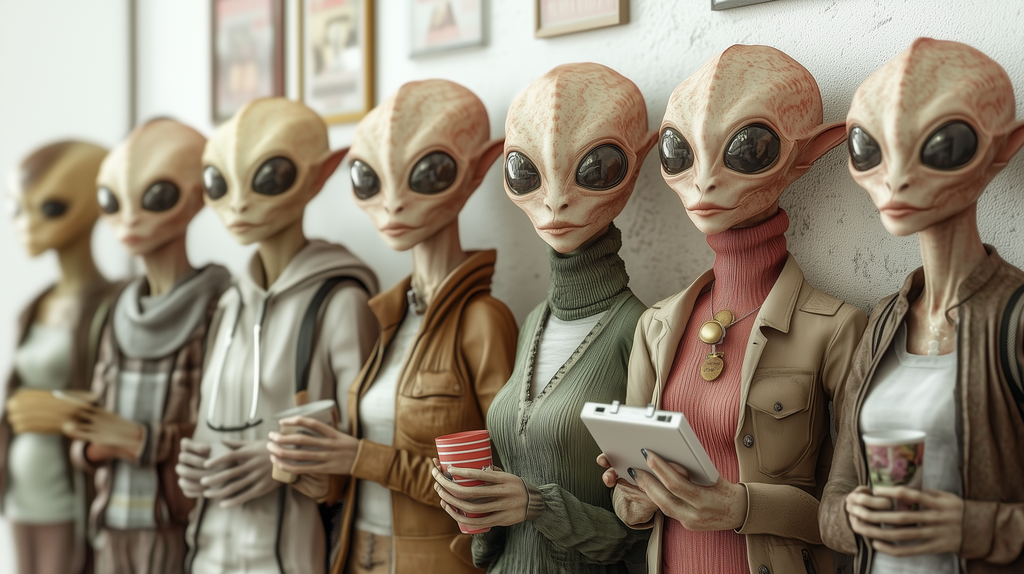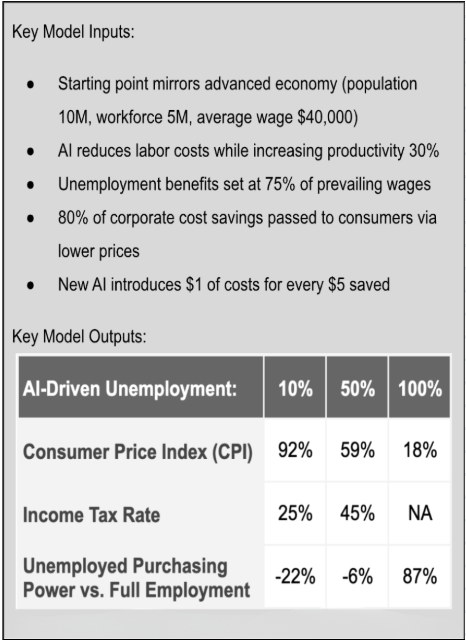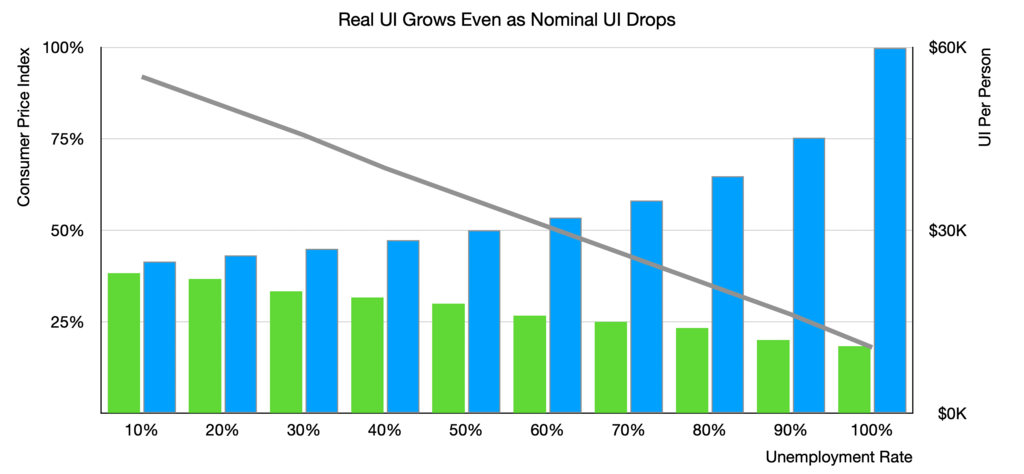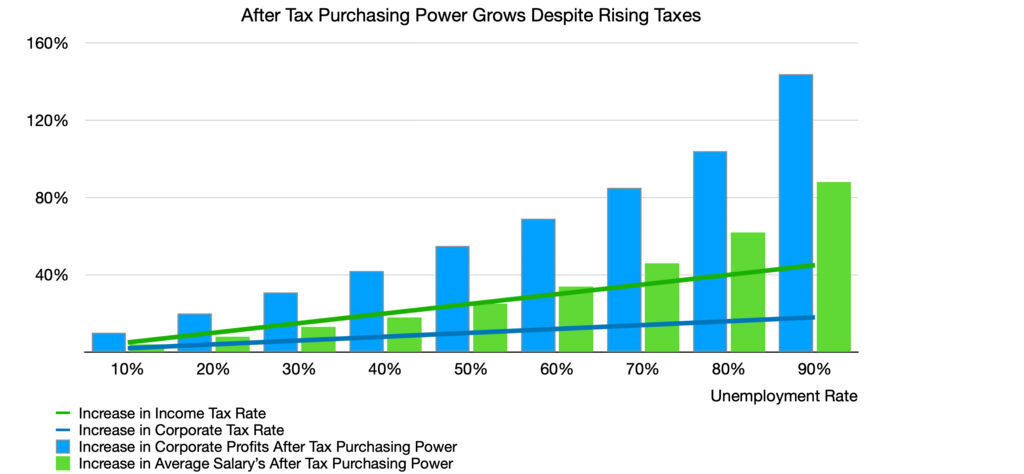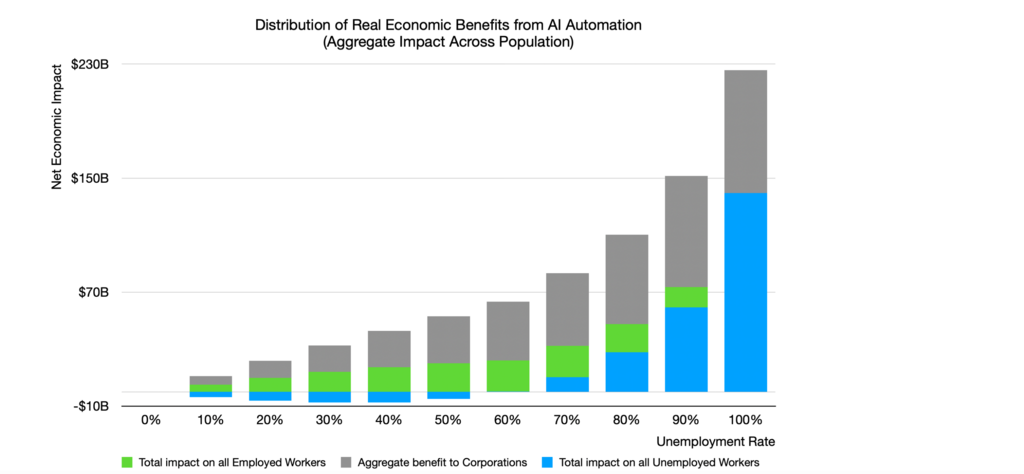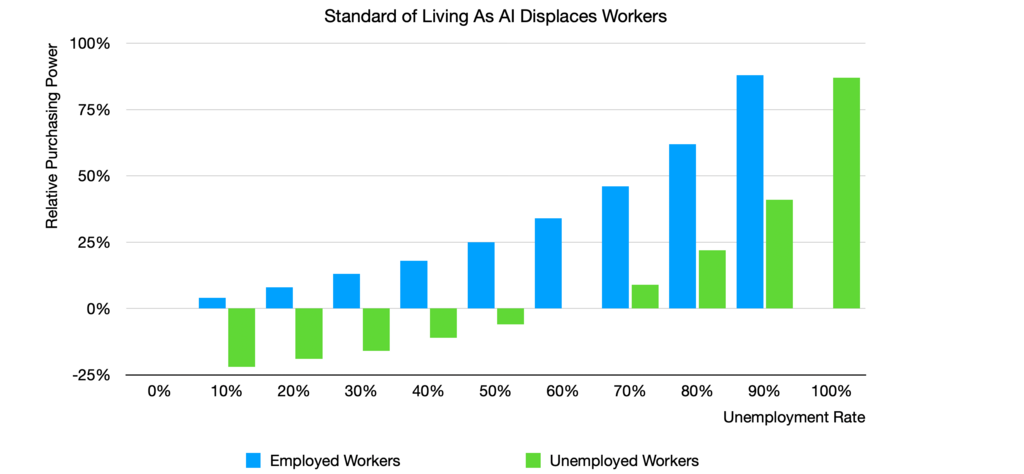
When Machines Replace Us: How We'll Thrive in the AI Era
Mass Unemployment Could Actually Lead to an Era of Unprecedented Abundance - If We Prepare Today
By Daniel Schreiber
I witness artificial intelligence replacing humans on a daily basis. At Lemonade, the insurance company I manage, almost all policies are sold by chatbots rather than agents, and most claims are settled within seconds without human intervention. As a result, while the company saw 200% growth in gross profit over the past two years, its workforce shrank. Many companies at the technological frontier report similar phenomena.
As an executive I welcome these AI dividends, but as a father, grandfather, and citizen, I'm preoccupied by where this leads. As best I can tell, everything that humans can do with neurons firing in our brains, artificial neurons will soon do better, faster, and cheaper. In more concrete terms: any job that can be done by people on Zoom today will be done by AI within a few years - without distractions, without strikes, without subsidized lunches, and almost for free. When that happens, no employer will be able to withstand the temptation - and eventually the imperative - to replace humans with machines.
I find this at once exhilarating and worrying. It’s exhilarating because it will likely make education, entertainment, and services in every field (medical, psychological, legal, financial) accessible at a level we've never seen before, at prices everyone can afford. It’s worrying, of course, because the economic, social and political implications of rising unemployment and inequality are... worrying.
This is why I work with the MOSAIC AI Policy Institute to develop an appropriate response to the emerging threat. Our efforts so far have yielded a promising and surprising direction: AI-driven mass unemployment could make us all better off - provided we adopt thoughtful policies before automation causes irreversible damage.
This Time It's Different
Before developing our thesis, let's address those who reject the very notion that AI threatens human employment. Their argument goes something like this:
“Alarm about AI-driven unemployment reveals the limits of the doomsayers' imagination, not a problem in reality. Technological revolutions always bring out Cassandras, but then create more and better jobs than they displace. The printing press may have hurt scribes, but it boosted demand for writers, scientists, and theologians. The Industrial Revolution replaced physical labor, but it drove demand for bright minds to oversee and develop machines. It has always been thus, and thus it shall always be.”
It sounds compelling. But reflexively assuming the future will mirror the past is no substitute for thoughtful risk assessment, which in our case quickly reveals what's different about our predicament: Previous technological advances left vast areas where humans outperformed machines - this one won't.
Before the AI era, machines were brainless automatons, which increased demand for capable brains - something humans monopolized. But what happens when this exclusivity is lost to machines with superhuman intelligence? When adding value in the workplace, with which part of our being will we outcompete machines that are more dexterous, more reliable, more intelligent - and work 24/7/365 for a fraction of minimum wage?
True, machines don't yet surpass humans in all domains, but the game is rigged. According to AI’s ‘Scaling Laws’ - ‘Moore's Law’ on steroids - the total power available to AI doubles twice yearly. When technology improves exponentially while we move at an evolutionary pace, it's no contest. By the time workers complete retraining programs, their newly acquired skills are likely obsolete. This is a game of tag that humans cannot win.
The Aliens Have Landed
To understand where we might be heading, and how policy decisions can push us toward opposing outcomes, consider this thought experiment: Imagine that millions of aliens from an advanced civilization land in Israel one Sunday morning. They're incredibly intelligent, tireless, and—most surprisingly—they offer to work for free. Unsurprisingly, by Monday morning every employer has replaced their human workers with these more effective, less expensive, alien laborers.
What happens next?
Well, initially all products and services continue flowing without interruption. Factories, law offices, stores, and farms—now staffed by diligent aliens—continue producing goods and services without change. In fact, given the aliens' speed, precision, and persistence, all businesses produce more and better products and services overnight. What fun.
Until the first of the month arrives and no paycheck does - then everyone sharply cuts their spending. With plummeting sales, businesses idle their factories, despite the free labor, and cancel expansion plans. The economy spirals, and the economic crisis breeds a social and political crisis. What a mess.
But it doesn't have to unfold this way. What if on Tuesday of that fateful week, the government mandates that all businesses continue paying salaries to their fired workers? Or (economically equivalently) if the government taxes businesses enough to fund full unemployment benefits for all the jobless? Here's what would happen: People would maintain their spending patterns, prices would drop due to the alien efficiency, and the entire population would enjoy upgraded quality of life and leisure. Everyone would be unemployed, true, but everyone—citizens and businesses alike—would be economically better off than before the aliens arrived.
Modeling Rewarding Unemployment
Our alien scenario highlights the central tension of the AI era: Through job automation, AI increases production of all types of products and services, while reducing the total wages needed to consume those same products and services. These opposing forces push us in different directions: Increased production leads to economic abundance, while increased unemployment leads to economic contraction.
The thought experiment also points to a solution to this puzzle: A sufficiently robust income guarantee system can prevent a negative spiral and fuel a positive one. Income guarantees can take various forms: generous Universal Basic Income (UBI), generous Negative Income Tax (NIT), or generous, permanent, Unemployment Insurance (UI). In fact, any mechanism that provides the unemployed with financial security and disposable income approaching those of their salaried peers will achieve similar results.
To examine this hypothesis, we created a macroeconomic model simulating wages, unemployment benefits, living standards, corporate profits, tax rates and revenues as AI progressively replaces workers. The model revealed several key insights with real promise.
One is that AI-driven unemployment differs from unemployment of yesteryear. While cyclical unemployment is purely a drag on the economy, AI-driven unemployment maintains or grows output while lowering costs—which reduces prices. For example, the model suggests that at 30% unemployment, prices will have dropped by 24%. Therefore, as things become cheaper, the unemployed can maintain similar or improving living standards with an increasingly smaller stipend. This is what enables generous, permanent unemployment benefits for more and more unemployed.
The second insight is that as unemployment grows, tax rates must rise to fund the growing payouts of unemployment insurance, and to compensate for the shrinking income tax base. So far, so conventional. The novel part is that because AI makes everything cheaper, the after-tax purchasing power of employees and corporations actually rises despite climbing tax rates. At 30% unemployment, for instance, modeled income tax rises from 20% to 35%, yet workers can buy 13% more with their take-home pay.
The third is that the unemployed experience a cushioned drop in purchasing power upon losing their job, since unemployment benefits start at 75% of their last paycheck. Not too shabby. Moreover, as unemployment grows and AI's economic benefits compound, AI dividends become sufficient to ensure that all parts of the economy—including the unemployed—are better off than they were under full employment.
The bottom line is that Israel in the AI era can do more than survive - it can thrive alongside unemployment rates once considered apocalyptic. According to the model, people's standard of living could be 87% higher with full unemployment than with full employment, while corporate profits could rise by 144%. This is what successful policy looks like in the AI era.
From Model to Policy
The model suggests that thanks to two balancing forces—reduced production costs through automation and guaranteed income for automation's casualties—Israel can navigate to a wonderful future. On paper at least, GDP grows, everyone's quality of life improves, corporate profits surge, and society as a whole fares better, economically at least, as AI replaces us. However, transitioning from paper to reality will require wise management and varied complementary policies.
For instance, monetary policy will be crucial. Although the model shows disinflation in nominal terms, one would hope that the Bank of Israel will intervene to maintain price stability. Instead of falling prices, then, everyone will have more money, preserving the model's real economic gains.
Similarly, high taxes could drive away businesses, while generous unemployment benefits could attract a flood of unemployed from overseas. A policy of positive and negative incentives will be needed to minimize such arbitrage, alongside international coordination where possible.
The model locks unemployment benefits at 75% of wages, but in practice we’ll require a more adaptive policy to balance the preservation of work incentives (for those with jobs) with purchasing power preservation (for those without). While unemployment remains low, the bias should favor preserving work incentives, and vice versa.
It's worth noting that we've explored just one possible simulation among many: a specific configuration of distributing AI dividends between workers, unemployed and corporations; unemployment benefits instead of UBI; and raising existing taxes rather than introducing new taxes (like estate tax, land tax, "Netflix tax"). There's no mathematical necessity to these choices, and policymakers have a broad range of tools and configurations that can yield similar results.
Most importantly, the model is purely economic and ignores the identity and meaning challenges of unemployment. We focused on the first level of Maslow's hierarchy because it's a prerequisite for the higher levels—but it's no substitute for them. Policymakers must plan for a transition to a society where many don't get paid for their labor—yet all are gainfully employed in the deeper sense of the words.
Where To: Utopia or Dystopia?
The model maps a promising direction, but it's not the direction we're facing. If we leave the future to market forces, AI could ignite a chain reaction of rising unemployment, alarming inequality, and ultimately dystopian scenes of class warfare.
On the other hand, as the model and thought experiment demonstrate, a jobless future need not be dystopian. Indeed, in an ancient Jewish vision of utopia, people don't work, abundance flows, and we're all free for loftier pursuits.
"In those days, it will be very easy for people to make a living, so that with very little effort they will achieve great benefit." (Maimonides, Commentary on the Mishnah)
8 View gallery


Daniel Schreiber, CEO and co-founder of Lemonade, and Chairman of the MOSAIC AI Policy Institute
(PHOTO: Ben Kelmer)
"In that time there will be neither famine nor war, neither jealousy nor competition, for goods will flow abundantly and all delights will be freely available as dust." (Maimonides, Mishneh Torah)
In short, a jobless society can be either horrific or wonderful. If we want a happy ending to this story, we need policies for distributing AI's dividends so that everyone partakes. Conceptually, it might help to think of AI as a natural resource, like Israel's offshore gas fields. In practice, this means governments must, through taxation, capture some of AI's profits before they scatter, and share them with those whom AI 'lays off' before their spending contracts. Beyond the moral and Jewish imperatives, we've tried to show that such a policy is a prerequisite for preserving and maximizing AI's economic potential. As though it were some Disney movie: either everyone shares the treasure, or the treasure evaporates.
The policy decisions made today will likely have generational consequences. AI might have the power to pave the way to an era where—truly, and in our time—“goods will flow abundantly and all delights will be freely available as dust.” But this potential won't fulfill itself. Without deliberate intervention, AI could instead drag Israel into economic quicksand and social dystopia.
The key to reaching the more utopian outcome is for us—humans—to join hands, ensuring that the unemployed among us don't get pulled under but instead maintain their essential role as consumers fueling our collective progress. Only thus will the AI era benefit all. As a father, grandfather, and citizen, that's a direction I can get excited about.









